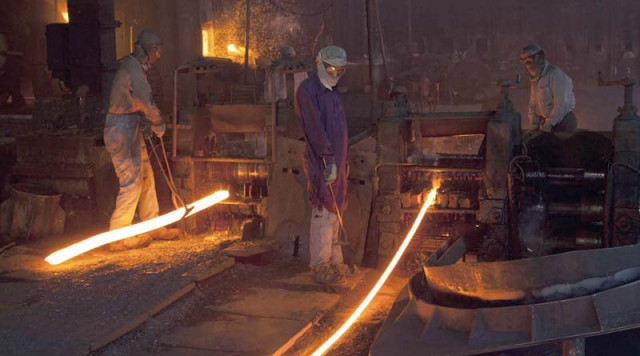Chinese imports hurt Pakistan’s men of steel
Government has imposed another 15% duty on imports, protecting local players

Despite the imposition of new duty, Chinese rebars are still cheap compared to premium branded rebars. PHOTO: FILE
Putting an end to the long-standing debate over whether another import duty on steel imports was conscionable – much less economically viable in view of the several construction projects the government alone has on the cards – the authorities ruled in favour of the producers.
A 15% import duty was imposed last week in order to protect the local steel industry from the influx of cheap imports, especially from China, taking the overall duty to 30%. This is in addition to the 5% customs duty levied on the import of steel products.
Although steel imports from China will subside only gradually because of the latest duty, the immediate jump in stock prices has given a reason to steel producers to rejoice.
PSM demands punitive duties on steel imports
Amreli Steels’ share closed at Rs52.03 on Pakistan Stock Exchange (PSX) KSE-100 index on Friday, gaining 7.1% over the week. Similarly, Mughal Steel’s share price jumped by 3.6% during the week, closing at Rs70.22.
Both companies were listed on PSX last year and have faced stiff competition from imported Chinese rebars since. Their profits were not as good as investors had initially anticipated, especially with their dismal performance in recent months, and investor disappointment was reflected in the lacklustre performance of the steel stocks.
“Amreli Steels’ last quarter’s results remained below expectations as competition from dumped Chinese substitutes toughened (amongst other reasons), forcing the steel maker to cut back on the price of its (premier) product,” commented a research report by Arif Habib Limited.
Given the relentless dumping of steel products from China - the world’s largest producer and exporter of steel - amid alleged over-capacity, a protective tariff structure was vital for the local industry, the report added.
The newly imposed duty was even better news for making local industry competitive in view of the uptick in the international steel rebar prices (up 15% since the end of February, retailing at $372 per ton due to commencement of peak construction season in China).
All this, it was hoped, would improve the dynamics of the Pakistani market.
This was not the first time that the government has placed an import duty to discourage the import of cheap Chinese steel. A similar 15% duty was slapped on steel imports in January last year (grossing to a total 30%, excluding the 5% customs duty).
“The government should have slapped the duty much earlier ... we requested for immediate protection for the local steel industry more than a year ago. They took so much time to decide,” a top official of a leading steel company said on condition of anonymity.
Faced by Chinese import, PSM incurs heavy losses
The new duty will help local players but it will take a while for the new equilibrium to emerge, he added. Despite the imposition of new duty, Chinese rebars are still cheap compared to premium branded rebars of Mughal and Amreli, which are commonly used for large construction projects.
Demand side
The prices of Chinese rebars, prior to the duty, stood at around Rs62,000 per ton, but the post-15%-duty-prices are expected to go up to Rs66,000-Rs67,000 per ton.
On the other hand, the price of branded rebars was in the range of Rs72,000-Rs74,000 per ton, informed a leading retailer who deals in both Chinese and local branded rebars in Karachi.
But the retailers and consequently, the consumers see this price disparity as neither emanating from underutilisation of local steel industry’s capacity or direct result of a better quality, but as a mere tool to mint money.
“Cheap Chinese rebars have provided a very good alternative to customers because they are of good quality. The government is protecting inefficient branded rebar producers who can’t cut down their costs. We want to sell as cheap as we can, it is not our problem if they are inefficient,” commented the retailer on condition of anonymity because he feared backlash from local players.
China-Pakistan Economic Corridor: Men of steel up against Chinese imports
Supply side
Local steel producers claim they are efficient, but they cannot compete against giant Chinese producers who enjoy massive subsidies from their government.
“If we are inefficient then all the steel producers in North America, Europe and India are inefficient because these countries have protected their steel industry from cheap Chinese imports over the last two years,” said the CEO of a leading steel company.
Pakistan’s annual steel demand is around 6.5 million tons, less than 1% of the 800-million-ton-Chinese-production-capacity.
Of the 6.5 million, Pakistan imports around 1.5 million tons of steel a year, 70% of which comes from China, mainly at the back of Chinese producer’s ultra-competitive price.
The writer is a staff correspondent
Published in The Express Tribune, March 28th, 2016.
Like Business on Facebook, follow @TribuneBiz on Twitter to stay informed and join in the conversation.



















COMMENTS
Comments are moderated and generally will be posted if they are on-topic and not abusive.
For more information, please see our Comments FAQ